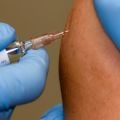Surprise discovery: for most animals, sperm quality does not reduce with age
17 January 2024
In humans, male fertility and sperm fitness decline with age, but scientists have made the surprising discovery that this pattern is not consistent in other animals. The findings have been published in the journal Nature Communications.
The team, led by the University of Oxford, assessed the results of 379 studies which covered a wide range of animals, including mammals, insects, birds, and fish. This found that, overall, advancing age seemed to have no impact on ejaculate size, number of sperm, sperm motility, or sperm viability.
For some animals, age even had a positive effect on reproductive traits. In many insect species, for example, ejaculate size, quantity of sperm, and sperm viability all improved with age. However, it is possible that this result may be explained by methodological limitations in the studies. For instance, in many insect studies, males were kept as virgins until old age, during which they are likely to accumulate sperm.
From all animals examined, only lab rodents showed age-related deterioration in most ejaculate traits measured. Dr Regina Vega-Trejo (Department of Biology, University of Oxford), co-lead author of the study, said: ‘The lack of consistency across animals in the impact of aging on ejaculate traits suggests the jury is still out on whether age-related deterioration in ejaculates happens universally in animals or not’.
According to the researchers, the sharp contrast in ejaculate ageing patterns between most animals and humans might be because humans now live much longer than they did just a few centuries ago. This may have led to men now living beyond the age at which they evolved to maintain sperm function. Co-lead author Krish Sanghvi (Department of Biology, University of Oxford), said: ‘The surprising differences between animals and humans could reflect stronger selection pressures for animals to maintain sperm function across all ages.’
The researchers also investigated whether age impacted reproductive outcomes (such as fertilisation success and fecundity) in the males of these species. Similar to ejaculate traits, they found that, overall, reproductive outcomes did not improve or decline with advancing age, which is again in stark contrast to what is seen in humans.
According to the authors, the results may be partly explained by methodological limitations, such as studies rarely testing animals that are at an advanced age for their species. They also suggest that deterioration in male fertility might not be occurring for each ejaculate trait in every species.
Senior author Dr Irem Sepil (Department of Biology, University of Oxford), said: ‘Reproductive deterioration is of interest to a broad range of disciplines, from evolutionary ecology and demography to humanities and medicine. Our study challenges a key belief in these fields that male reproductive deterioration is universal, and documents where we may expect this to occur and why.’
Notes for editors:
For media enquiries and interview requests, contact: [email protected]
The study ‘Meta-analysis shows no consistent evidence for senescence in ejaculate traits across animals’ has been be published in Nature Communications: https://doi.org/10.1038/s41467-024-44768-4
About the University of Oxford
Oxford University has been placed number 1 in the Times Higher Education World University Rankings for the eighth year running, and number 3 in the QS World Rankings 2024. At the heart of this success are the twin-pillars of our ground-breaking research and innovation and our distinctive educational offer.
Oxford is world-famous for research and teaching excellence and home to some of the most talented people from across the globe. Our work helps the lives of millions, solving real-world problems through a huge network of partnerships and collaborations. The breadth and interdisciplinary nature of our research alongside our personalised approach to teaching sparks imaginative and inventive insights and solutions.
Through its research commercialisation arm, Oxford University Innovation, Oxford is the highest university patent filer in the UK and is ranked first in the UK for university spinouts, having created more than 300 new companies since 1988. Over a third of these companies have been created in the past five years. The university is a catalyst for prosperity in Oxfordshire and the United Kingdom, contributing £15.7 billion to the UK economy in 2018/19, and supports more than 28,000 full time jobs.
The Department of Biology is a University of Oxford department within the Maths, Physical, and Life Sciences Division. It utilises academic strength in a broad range of bioscience disciplines to tackle global challenges such as food security, biodiversity loss, climate change and global pandemics. It also helps to train and equip the biologists of the future through holistic undergraduate and graduate courses. For more information visit www.biology.ox.ac.uk.
 New study estimates NHS England spends 3% of its primary and secondary care budget on the health impacts of temperature
New study estimates NHS England spends 3% of its primary and secondary care budget on the health impacts of temperature
 International collaboration launches largest-ever therapeutics trial for patients hospitalised with dengue
International collaboration launches largest-ever therapeutics trial for patients hospitalised with dengue
 Oxford-built multi-agent assistant for cancer care to be piloted in collaboration with Microsoft
Oxford-built multi-agent assistant for cancer care to be piloted in collaboration with Microsoft
 World's first Phase II Nipah virus vaccine trial launch
World's first Phase II Nipah virus vaccine trial launch